Matthew K. Lovelace
August 10th, 2008-08-08
Malachi 3: 16-17 “ Then those who feared the Lord talked with each other, and
the Lord listened and heard. A scroll of remembrance was written in his presence
concerning those who feared the Lord and honored His name. They will be mine,
says the Lord Almighty, in the day when I make up my treasured possession. I will
spare them, just as in compassion a man spares his son who serves him. And you
will see the distinction between the righteous and the wicked, between the those who serve God and those who do not.”
“ I the Lord do not change.” This morning my heart chooses to believe this. My mind and emotions would rebel otherwise. I trust that a sovereign almighty Lord is unchanging in his character and nature. That our Savior does distinguish the unrighteous and imposters from the righteous and committed. That despite the hurt and pain, even to His own children and followers, we are still His “ treasured possessions.” He will make this earth right someday.
This truth covers me with hope when the reality of experiences in Africa demonstrates otherwise. Life here in Africa, and specifically the Sudan, is harsh and raw. Over the last several weeks I’ve experienced first hand how devastating the effects of AIDS, disease, cruelty and people are. So often I receive prayer letters, glance at the opening scripture passage quickly then really focus on the meat of the missionaries stories and work. So I feel a little funny writing out scripture on my own here… but these verses from Malachi were exactly what I needed to read this morning.
Forgive me for having been away from internet contact lately, bad connections lately in Torit and then a good portion of my short trip to Arua, Uganda followed by Kampala were spent recovering from repeated bouts with malaria, parasites, and lots of other fun, friendly and endearing protozoa. When in doubt apparently go to a local, though notable, Kampala medical clinic and take lots and lots of blue pills! They did wonders for me. On a serious note though I cannot say strongly enough that there have been several illness bouts and some physical issues that have cleared up over time; Very thankful for His healing power.
News from the school: The Sudan examinations have begun, so Kyle and I are “busy” supervising hundreds of young men and women taking their end term tests. This may last several weeks…then a short break followed by a return to classes in late August. It’s been a difficult road for me at the school, I am floored by the opportunity to be in a secular school system in the Sudan ( all the Lord’s action ) and to have another AIM missionary join me, Kyle Kemp, and see him interact and grow at the school is truly the Lord’s handiwork. Quite often I feel the weight of being a pioneering missionary in allowing the Lord to use me as a ‘ foundation.’ Teaching at the Torit Secondary School though in regards to my actual teaching and input at the school has been minimal at best. A large portion of my time in Torit has been far more centered on building relationships this past year…wow, yeah, almost a year. Any measurable, tangible vocation has been set aside for this purpose I pray and trust. It’s been a remarkable nearly one year so far.
Some other developments:
The local Bible studies which were taking place with the nearby Kenyan laborers has come to a stop. The Lopii company that hired the men have closed their operations in Torit. That short time with these great guys have made me far more aware even now of the need to train and equip as ‘ we do not know the day nor hour.”
Forming a Scripture Union at the secondary school is taking time. A local Sudanese ministry official is helping push this process. Unfortunately, in the Sudan even a local Christian school program is subjected to the pull of local politics. At times I wonder if a functioning Scripture Union will develop here in Torit during my lifetime. I’ve also found that being here, and pushing for this program, may be the extent of my work in the S.U..
From this point on our local Africa Inland Church and Ministry officials need to collaborate to produce an organization such as Scripture Union. To that extent my hands are tied really…
During my last trip into Kampala I did some follow up research and work with local pastors and schools in regards to a possible Mslim ministry potential. I also had a few meetings with AIM’s Central Region administrators about looking into moving at some point to Kampala, Uganda to help spearhead a ministry through the secular educational system. My interest in this avenue ( and possible change in location ) is strong. Would this be a radical change? Yes, in that I will be moving from the Sudan. No, however, in that Kampala has become a second home and any move would involve teaching and working more closely with establishing and building relationships geared toward reaching Mslims. Also, AIM has streamlined its administrative borders, so Uganda is in the same AIM administrative district as is the South Sudan. We are all working together as an AIM team though we live in different locations. Above all, is the Lord deeply involved in this decision, or future move?
Will you lift this possible change and move in ministry up in prayer? I feel confident in allowing the Lord to move me in this way, but always desire you, my supporters to be a part of this change and also to approve.
Kampala

orphanage visit
Wednesday, August 27, 2008
Comments about Torit by Missionary friend Gene in August 2008
We landed on a grassy airstrip in Nimule, right at the border Northern Uganda and Southern Sudan. I am still amazed on the simplicity of these airstrips and the ruggedness of the planes that land on these sites. Your welcoming party usually sits atop pickups or Toyota Landcruisers while rudimentary huts serve as their control towers. On this flight, the only passengers on this Mosquito (the plane) were me and Bishop Johnson. Quite a nice fellow. One thing about traveling is that you get to meet really interesting people. He is the bishop of the District of Torit (DOT), but had to stop by Nimule for a formal function. I admire Catholic priests, maybe because my great uncle was one and I admired what he had done. And maybe also I think it would be neat to wear a collar…I admire men in uniform, haha. Anyways, I digress again.
So we dropped off Bishop Johnson and we picked up Darlene (who is a nurse/mid-wife) who hails from Ohio to spend a couple of weeks with her daughter (who works in an orphanage). So off we went and in another 30 minutes (about NE of Nimule), we were again on the ground in Torit, Sudan. Once we had stopped rolling, I see Kyle Kemp (a short-termer from MN) holding out a white piece of paper with my name written on it approaching the plane. Haha, that cracked me up! He thought that I might get lost and confused in the ‘crowds.’ Haha, nonetheless, I felt very welcomed indeed! It was good to see Kyle. He spent a month with me in Kampala before coming up to Sudan with Matthew Lovelace. Kyle is such a good guy. Although he is a bit younger he is down-to-earth, not pretentious and funny. I am not very good with explaining, but you will have to take my word for it. So now, with me up here, all three of us are reunited, once again. It is good to be in the company of other men (no offense to the other girls) – if you can call us that. I still feel like I am a boy. Anyways, Matthew was down in Kampala with me the other week for a break so it is good that we get in touch several times throughout the year.
The air smelled of manure: not the best first impression, but, oh well, we will have to live with that. I later find out from Matthew and Kyle that the locals tended to use the other side of the airstrip as the town public restroom – wonderful! Thus the odor that I smelled was not from livestock but from humans: not the most pleasant thought. Actually, as I walked around town the smell of human feces was an all too common feature that really never left you. Plus, you really had to be careful on where you step…especially when you are trudging through taller grass. Fortunately, I have yet to step on any.
The AIM (Africa Inland Mission) field house is interestingly right beside the airstrip, which makes it a really cool place to be. Just imagine planes and helicopters landing in your backyard ever so often?! So, currently the AIM unit leaders are on home assignment and it is only Matthew and Kyle that are manning this ‘outpost.’
Invigilating?!
It is funny how people who speak English as their second language tend to use the more formal words. I know how that feels because I tended to that as well, even now. This is the last week of the second term and Matthew and Kyle are usually out in the school invigilating (you will have to look that one up if you want to know what that means) for most of the day.
What HIV/AIDS?!
I, on the other hand, walked over to the local hospital to just take a quick glance. I ended up hanging out with a bunch of instructors for the nursing school. The two in particular I was talking with were initially stationed in Juba (the capital of Southern Sudan), but was recently transferred over to Torit. Government employees, especially in health-related and educational fields usually do not have a say on where they are stationed. At times they can be posted in a region quite far from their family. This seems to be the norm here in Africa. Anyways, they asked me where I was from and I had to tell them that I was born in the Philippines but I am currently living in the United States. Often times, Africans do not believe that I am American – understandably so, because I am not white (that is ok though).
Anyways, we got to talking to what I was going here in Sudan and overall, Africa – and all the details that comes with that. Basically, the usual. They asked what was my impression on the HIV/AIDS situation – and I told them: honestly speaking, the spread and prevalence of HIV/AIDS here in Africa, if not, in the world are preventable and controllable. It is through the behavior and in some part culture that the HIV/AIDS pandemic has such a devastatingly deadly impact here in Africa. And…in unison, they nodded approvingly – I found that interesting, but not surprising. I know most Africans – well at least the people I have met – know what the problem is. Haha – but the conundrum is with the knowledge of the problem itself. Are people willing to change their behavior or more challengingly (is that a word) their culture/customs to combat this situation. I think with behavior – it will be easier to change with education and the knowledge that comes with it. However, with culture and customs that is so ingrained into the people itself it would be a more challenging endeavor. But I catch myself, as I think and write about this I realized that often times our behavior stems from our customs and culture, true? Duh! Still, there is hope – I see some changes and what can be done successfully in places like Kampala, Uganda. People are more aware and are slowly realizing the consequences of their behavior and the ‘imperfections (?)’ of their culture and customs. Here in Sudan, on the other hand, has a long way to go. Apparently, they do not have much of a problem with HIV/AIDS as compared with other countries. In fact, they say that they fear that the influx of people due to a lull in the fighting will bring potential infected people into the region. However, they really cannot prove that since they do not have any type of surveillance or education program regarding HIV/AIDS in the region yet. Oh well. The same goes when I went up to the Horn of Africa.
Anyways, I am realizing that there is no ‘perfect’ culture. Each has its own strengths and weaknesses – and more importantly there are definitely some absolute right and wrong in each. Would you ever think that female genital mutilation (or maybe you might want to term it as ‘circumcision’) as being ‘alright’ in certain cultural contexts? Hmm…I do not think so, but you are welcome to disagree.
With that said, I often ask myself where God is in all of this – and how, we as believers manifest His will in addressing these problems. In part, I sincerely know that when faced with these issues first hand, we are His hands and feet in doing something practical about it. We do something physical and worthwhile, right? We are ultimately humanitarians (and there is nothing wrong with that word) and a lot of us have heard this call at home and abroad. Jesus did the same a while back – so I figure we should do likewise. Yet for us who believe, there is more to life than what we see – and all of us, believer or not, crave something deeper like the woman near the well. Jesus also answered that. Body and soul – our God wants to heal and bring us back to Him. Unfortunately, I – we know that it is not all perfect in the real world and death and injustices still happen even when we try to stop it.
So we are back to the reality of the HIV/AIDS pandemic – besides other things – that is affecting Africa. There are a ton of things going wrong in this ‘dark continent’ – yet for some reason, there is still so much hope. I am reminded of the hardships Joseph went through when he was initially sold into slavery by his own brothers, wrongly accused by potiphar and forgotten by the baker – before at last he became the second most powerful man in Egypt. It is amazing how he clung to the reality of his God, remained faithful and waited patiently for God’s timing. In the end, when he confronted his brothers fearing retribution he said with sincerity, “ you intended to harm me, but God intended it for good to accomplish what is now being done, the saving of many lives (Genesis 50:20).” I find it funny at times, that even with all these bogus and fake pastors in Africa, the reality of God is still so fiercely pursued among Africans. Maybe the presence of so many problems here in Africa is there for some reason – whether it is by God’s will or man’s doing, or both – hopefully, will produce the good God intended. And at the same time, we will there cooperating with Him to facilitate it.
So we dropped off Bishop Johnson and we picked up Darlene (who is a nurse/mid-wife) who hails from Ohio to spend a couple of weeks with her daughter (who works in an orphanage). So off we went and in another 30 minutes (about NE of Nimule), we were again on the ground in Torit, Sudan. Once we had stopped rolling, I see Kyle Kemp (a short-termer from MN) holding out a white piece of paper with my name written on it approaching the plane. Haha, that cracked me up! He thought that I might get lost and confused in the ‘crowds.’ Haha, nonetheless, I felt very welcomed indeed! It was good to see Kyle. He spent a month with me in Kampala before coming up to Sudan with Matthew Lovelace. Kyle is such a good guy. Although he is a bit younger he is down-to-earth, not pretentious and funny. I am not very good with explaining, but you will have to take my word for it. So now, with me up here, all three of us are reunited, once again. It is good to be in the company of other men (no offense to the other girls) – if you can call us that. I still feel like I am a boy. Anyways, Matthew was down in Kampala with me the other week for a break so it is good that we get in touch several times throughout the year.
The air smelled of manure: not the best first impression, but, oh well, we will have to live with that. I later find out from Matthew and Kyle that the locals tended to use the other side of the airstrip as the town public restroom – wonderful! Thus the odor that I smelled was not from livestock but from humans: not the most pleasant thought. Actually, as I walked around town the smell of human feces was an all too common feature that really never left you. Plus, you really had to be careful on where you step…especially when you are trudging through taller grass. Fortunately, I have yet to step on any.
The AIM (Africa Inland Mission) field house is interestingly right beside the airstrip, which makes it a really cool place to be. Just imagine planes and helicopters landing in your backyard ever so often?! So, currently the AIM unit leaders are on home assignment and it is only Matthew and Kyle that are manning this ‘outpost.’
Invigilating?!
It is funny how people who speak English as their second language tend to use the more formal words. I know how that feels because I tended to that as well, even now. This is the last week of the second term and Matthew and Kyle are usually out in the school invigilating (you will have to look that one up if you want to know what that means) for most of the day.
What HIV/AIDS?!
I, on the other hand, walked over to the local hospital to just take a quick glance. I ended up hanging out with a bunch of instructors for the nursing school. The two in particular I was talking with were initially stationed in Juba (the capital of Southern Sudan), but was recently transferred over to Torit. Government employees, especially in health-related and educational fields usually do not have a say on where they are stationed. At times they can be posted in a region quite far from their family. This seems to be the norm here in Africa. Anyways, they asked me where I was from and I had to tell them that I was born in the Philippines but I am currently living in the United States. Often times, Africans do not believe that I am American – understandably so, because I am not white (that is ok though).
Anyways, we got to talking to what I was going here in Sudan and overall, Africa – and all the details that comes with that. Basically, the usual. They asked what was my impression on the HIV/AIDS situation – and I told them: honestly speaking, the spread and prevalence of HIV/AIDS here in Africa, if not, in the world are preventable and controllable. It is through the behavior and in some part culture that the HIV/AIDS pandemic has such a devastatingly deadly impact here in Africa. And…in unison, they nodded approvingly – I found that interesting, but not surprising. I know most Africans – well at least the people I have met – know what the problem is. Haha – but the conundrum is with the knowledge of the problem itself. Are people willing to change their behavior or more challengingly (is that a word) their culture/customs to combat this situation. I think with behavior – it will be easier to change with education and the knowledge that comes with it. However, with culture and customs that is so ingrained into the people itself it would be a more challenging endeavor. But I catch myself, as I think and write about this I realized that often times our behavior stems from our customs and culture, true? Duh! Still, there is hope – I see some changes and what can be done successfully in places like Kampala, Uganda. People are more aware and are slowly realizing the consequences of their behavior and the ‘imperfections (?)’ of their culture and customs. Here in Sudan, on the other hand, has a long way to go. Apparently, they do not have much of a problem with HIV/AIDS as compared with other countries. In fact, they say that they fear that the influx of people due to a lull in the fighting will bring potential infected people into the region. However, they really cannot prove that since they do not have any type of surveillance or education program regarding HIV/AIDS in the region yet. Oh well. The same goes when I went up to the Horn of Africa.
Anyways, I am realizing that there is no ‘perfect’ culture. Each has its own strengths and weaknesses – and more importantly there are definitely some absolute right and wrong in each. Would you ever think that female genital mutilation (or maybe you might want to term it as ‘circumcision’) as being ‘alright’ in certain cultural contexts? Hmm…I do not think so, but you are welcome to disagree.
With that said, I often ask myself where God is in all of this – and how, we as believers manifest His will in addressing these problems. In part, I sincerely know that when faced with these issues first hand, we are His hands and feet in doing something practical about it. We do something physical and worthwhile, right? We are ultimately humanitarians (and there is nothing wrong with that word) and a lot of us have heard this call at home and abroad. Jesus did the same a while back – so I figure we should do likewise. Yet for us who believe, there is more to life than what we see – and all of us, believer or not, crave something deeper like the woman near the well. Jesus also answered that. Body and soul – our God wants to heal and bring us back to Him. Unfortunately, I – we know that it is not all perfect in the real world and death and injustices still happen even when we try to stop it.
So we are back to the reality of the HIV/AIDS pandemic – besides other things – that is affecting Africa. There are a ton of things going wrong in this ‘dark continent’ – yet for some reason, there is still so much hope. I am reminded of the hardships Joseph went through when he was initially sold into slavery by his own brothers, wrongly accused by potiphar and forgotten by the baker – before at last he became the second most powerful man in Egypt. It is amazing how he clung to the reality of his God, remained faithful and waited patiently for God’s timing. In the end, when he confronted his brothers fearing retribution he said with sincerity, “ you intended to harm me, but God intended it for good to accomplish what is now being done, the saving of many lives (Genesis 50:20).” I find it funny at times, that even with all these bogus and fake pastors in Africa, the reality of God is still so fiercely pursued among Africans. Maybe the presence of so many problems here in Africa is there for some reason – whether it is by God’s will or man’s doing, or both – hopefully, will produce the good God intended. And at the same time, we will there cooperating with Him to facilitate it.
Subscribe to:
Comments (Atom)
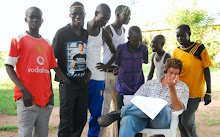
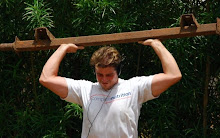
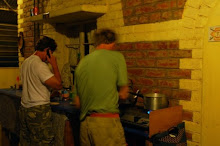
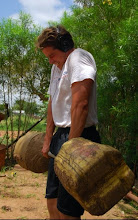
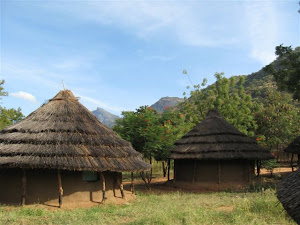.jpg)
.jpg)